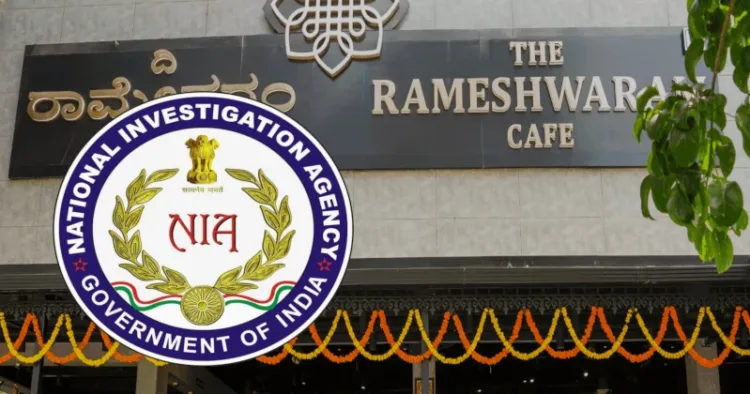The National Investigation Agency (NIA) has filed a third supplementary chargesheet against two accused in the Rameshwaram Cafe blast case, which is connected to a broader conspiracy involving the Islamic State (ISIS). The chargesheet, submitted on September 24, implicates Abdul Mateen Ahmed Taha and Massawir Hussain Shajib in serious offences, including recruitment, radicalisation, and financial support for terrorism. Both are accused of actively furthering ISIS’s violent agenda in India.
The NIA’s ongoing investigation revealed that Taha and Hussain were not only involved in inciting Muslim youth to join radical activities but also provided financial backing to terror operations. The two are residents of Shimoga district, Karnataka, and their alleged actions were part of a larger plan orchestrated by ISIS to destabilise the country. The case initially investigated by the Karnataka Police in September 2022 was later handed over to the NIA in November 2022, owing to its links with international terrorism.
The chargesheet accuses Taha and Hussain of engaging in radicalisation efforts, recruitment of youth for terrorism, and providing logistical and financial support to ISIS operatives in India. According to the NIA, the two were responsible for planning and executing violent activities aimed at destabilising India. Among their activities, the accused were involved in arson, trial explosions, and burning the Indian national flag. The NIA’s statement outlines that their involvement was part of ISIS’s broader conspiracy to promote terror and undermine national security.
The investigation has revealed deep connections between the accused and the global terror network ISIS. Taha and Hussain were instrumental in recruiting youth, indoctrinating them with radical ideologies, and guiding them into violent terror activities. The NIA’s findings indicate that these individuals were not just involved in terror financing but also active in facilitating blasts and other terror-related incidents.
The Rameshwaram Cafe blast, which occurred on March 1 and injured nine people, was part of a series of violent activities orchestrated by the accused. This included a failed attempt to detonate an improvised explosive device (IED) at the state Bharatiya Janata Party (BJP) office in Malleshwaram, Bengaluru, on January 22, during the Pran Pratishtha ceremony at Ayodhya. Following this failed attempt, the accused carried out the Rameshwaram Cafe blast.
This latest chargesheet marks the third supplementary filing by the NIA in connection with the Rameshwaram Cafe blast case. So far, ten individuals have been charged in this case. The NIA’s detailed investigation continues to uncover the extent of ISIS’s involvement in India and the role played by domestic operatives in promoting its agenda. The agency has been diligent in dismantling these terror networks, and more details are expected to emerge as the investigation progresses.
The case, originally registered by Karnataka Police in September 2022, was handed over to the NIA in November 2022 when it became apparent that the incident was linked to anti-India activities spearheaded by the banned ISIS. The NIA’s ongoing investigation has unveiled a network of radicalisation, terror financing, and violence aimed at destabilising India, with Taha and Hussain playing key roles.
Earlier this month, the NIA’s probe revealed that Taha and Hussain were also responsible for the failed IED attack at the BJP office. Their involvement in these terror activities showcases a determined effort to sow chaos and disrupt public order.
The NIA’s continued action against terror networks in India has underscored the growing threat posed by ISIS and similar organisations. The agency’s focus on curbing radicalisation and terror financing remains critical to its strategy. This case, in particular, highlights how domestic operatives are aiding international terror organisations in spreading their extremist ideologies within the country.
With the latest chargesheet filed, legal proceedings in the Rameshwaram Cafe blast case are expected to intensify. The NIA’s investigation is part of a broader national effort to thwart terrorism and protect India’s internal security from external and internal threats.
The NIA’s work on this case serves as a reminder of the persistent threat posed by ISIS and other extremist organisations. The agency remains committed to dismantling such terror networks and preventing further radicalisation and violence.



















Comments